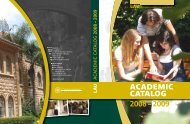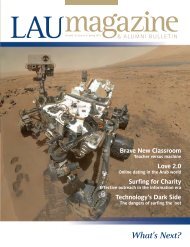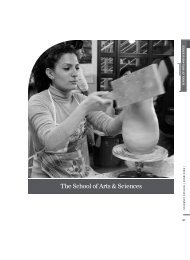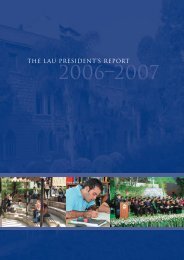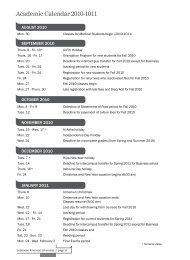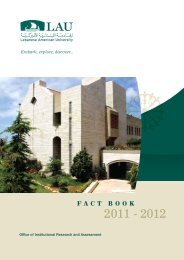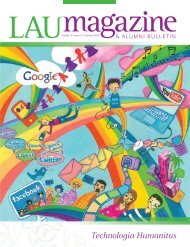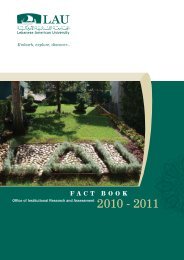academic-catalog2011.. - LAU Publications - Lebanese American ...
academic-catalog2011.. - LAU Publications - Lebanese American ...
academic-catalog2011.. - LAU Publications - Lebanese American ...
Create successful ePaper yourself
Turn your PDF publications into a flip-book with our unique Google optimized e-Paper software.
Department of Humanities<br />
The rationale to give a choice of three courses<br />
(9 credits) of minor core requirements is to allow<br />
students to choose where their interests lie,<br />
either in the language per se or in literature or<br />
a mixture of both. The literature and language<br />
courses are those which already exist in the B.A.<br />
English Program and are good representations of<br />
the course offerings. The selection of courses<br />
has been made in order to offer the student a<br />
comprehensive overview of what can be called a<br />
‘miniature B.A. English degree’.<br />
MASTER OF ARTS DEGREE<br />
PROGRAMS<br />
M.A. IN COMPARATIVE LITERATURE<br />
Comparative Literature is the critical study of<br />
texts in two or more languages. Practitioners most<br />
often describe their work as the interdisciplinary<br />
study of literature, and other cultural productions,<br />
across national, ethnic and linguistic boundaries.<br />
Periods, genres, themes, movements and crosscultural<br />
influences are among the objects of<br />
study. Comparatists draw their methods from the<br />
literary tradition as well as from other fields of the<br />
Humanities and the Sciences.<br />
Graduates of the M.A. Program in Comparative<br />
Literature can pursue several career options:<br />
• Enter a Ph.D. Program in literature or<br />
comparative studies.<br />
• Obtain advanced standing in secondary<br />
school teaching<br />
• Work as literary translators.<br />
• Work as specialists in literature, and<br />
culture for the press, in publishing, in<br />
diplomacy, or in business<br />
MISSION<br />
The Mission of the Graduate Program in<br />
Comparative Literature is to teach, train, and<br />
conduct research in literature and trans-cultural<br />
studies, with special attention to Lebanon and the<br />
Middle East. The Program offers coursework in<br />
English, Arabic, Persian and French, in response<br />
to the students’ needs and capacities. The aim<br />
is to explore the role of culture in a multi-ethnic<br />
globalizing world.<br />
EDUCATIONAL OBJECTIVES<br />
The purpose of the Graduate Program in<br />
Comparative Literature is to:<br />
1. Offer students linguistic and cultural<br />
training in more than one cultural zone.<br />
2. Offer students a highly individualized<br />
curriculum, through close cooperation with<br />
other disciplines in the humanities, arts,<br />
and social sciences.<br />
3. Allow students to acquire an exceptional<br />
degree of expertise in regional intercultural<br />
relations, and a broadened perspective on<br />
the variety, and complexity, of the Middle<br />
Eastern cultures, combined with advanced<br />
training in critical and poststructuralist<br />
theories.<br />
4. Explore a range of literary, and cultural,<br />
theories, and demonstrate significant<br />
mastery of one or two.<br />
5. Achieve broad intercultural competence in<br />
genre, period, and theme.<br />
6. Receive advanced training in written and<br />
oral communication through working with<br />
experienced researchers.<br />
LEARNING OUTCOMES<br />
Graduate students in Comparative Literature will<br />
be able to:<br />
1. Develop a high level of specialization in<br />
methodology, theory, periods, themes<br />
and literary genres that constitute the<br />
framework within which they can pursue<br />
their study and research.<br />
2. Develop the skills to teach, train, and<br />
to conduct research in literature and<br />
transcultural studies, with special attention<br />
to Lebanon and the Middle East in general.<br />
3. Acquire an exceptional degree of expertise<br />
in regional intercultural relations.<br />
4. Obtain advanced standing in secondary<br />
school teaching, work as literary<br />
translators, or work as specialists in<br />
literature and culture for the press, for<br />
international publishers, in diplomacy, and<br />
in international organizations.<br />
5. Acquire the knowledge and the skills which<br />
qualify them to pursue their education in<br />
the field at the Ph.D. level.<br />
ACADEMIC CATALOG [ 2011-2012 ] SCHOOL OF ARTS AND SCIENCES<br />
147



